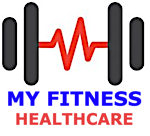The Physiopedia team recently traveled to Dubai for the World Physiotherapy Congress to highlight some of the important work towards strengthening the rehabilitation workforce as part of the ReLAB-HS activity.
ReLAB-HS aims to ensure equal access to rehabilitation care around the world; ensuring the right care is provided at the right time and in the right way. In line with this aim, the work of the Physiopedia team has focused on building workforce capacity. More specifically, the team has been working towards understanding workforce development needs and responding to specific findings by the development of tools and resources that are GESI (Gender Equity and Social Inclusion) sensitive, including the translation of learning content into multiple languages. Some of the work to date was presented as posters, which are a fantastic way to start a conversation and to tell a story. We are pleased to share them here for all of the rehabilitation community to openly access.
The team began their work by exploring the current global rehabilitation workforce development needs through a situational analysis. The educational situational analysis was used to help understand what education and professional development is currently being provided and identify any unmet needs or challenges. The work identified a significant gap in regulation of the rehabilitation professions especially in low- and low-middle income countries. There is a significant need to increase the availability of continuing professional development opportunities, especially for neurological conditions, and there are multiple challenges to overcome, including barriers to accessing online resources. This information has been used to inform the creation of resources and activities that will appropriately support the educational needs of the rehabilitation workforce around the world. 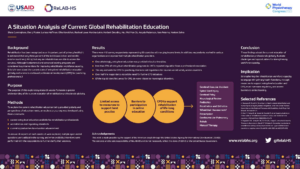
A more focused effort continued with a closer look at entry-level education in four countries: Burma, Pakistan, Uganda and Ukraine. Through an in-depth review of educational standards, programmes and curricula, the team was able to identify key questions and a robust plan to develop an academic programme reflection tool. This tool is intended to guide academic leaders through reflective processes, in order to develop academic programmes that are context specific and aligned with international standards. This was presented specifically related to the context in Ukraine.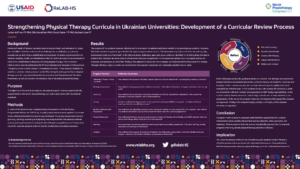
As a response to challenges identified in the education situational analysis, ReLAB-HS has supported the development of translated courses on Physiopedia Plus (Plus). To date, nearly 200 (of the 600+) courses have been made available in Spanish, German, Italian, French and Ukrainian. Again, this poster was presented in the context of Ukraine, which demonstrated that the translation of Plus courses leads to better participation, engagement and completion rates among people learning in their native language compared to when they learn in English.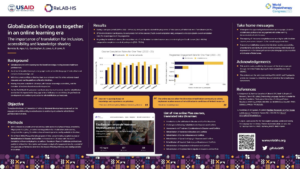
How gender equality and social inclusion (GESI) impacts rehabilitative care is of growing interest around the world. In response to the need for a GESI-sensitive and aware rehabilitation workforce, Plus is working towards offering GESI-related content to rehabilitation professionals. Data from the first two published courses, An Introduction to GESI and Introduction to Affirming Care for Gender and Sexual Minorities, was explored. Although the courses gained good engagement and high completion rates, low overall participation rates indicate that people are not choosing to develop GESI-related knowledge. Given that there is a global need for a GESI-responsive rehabilitation workforce, research has shown that clinicians and students do not feel adequately trained to be GESI-responsive, and there is a discrepancy between the practical need for GESI training in rehabilitation and what is taught to students and clinicians. This finding is concerning, and suggests that we need to do more to raise awareness of the need to participate in GESI training.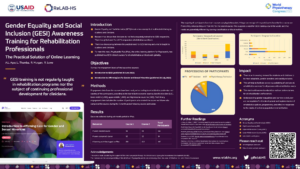
This important work as part of the ReLAB-HS activity is ongoing. What better way to tell a story and start a conversation than through poster presentations!


ReLAB-HS is made possible by the generous support of the American people through the United States Agency for International Development (USAID) and
is implemented under cooperative agreement number 7200AA20CA00033. The consortium is managed by prime recipient, Johns Hopkins Bloomberg School of Public Health.
